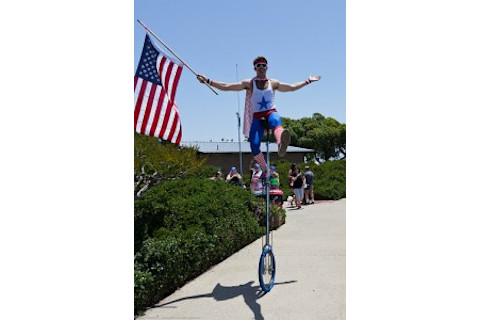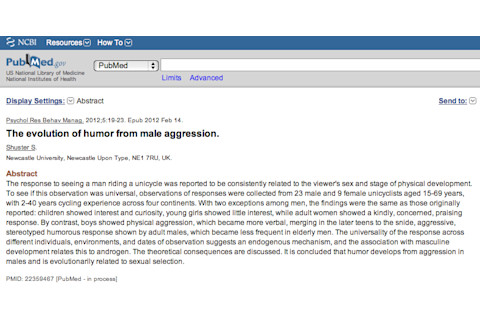
"The response to seeing a man riding a unicycle was reported to be consistently related to the viewer's sex and stage of physical development. To see if this observation was universal, observations of responses were collected from 23 male and 9 female unicyclists aged 15-69 years, with 2-40 years cycling experience across four continents. With two exceptions among men, the findings were the same as those originally reported: children showed interest and curiosity, young girls showed little interest, while adult women showed a kindly, concerned, praising response. By contrast, boys showed physical aggression, which became more verbal, merging in the later teens to the snide, aggressive, stereotyped humorous response shown by adult males, which became less frequent in elderly men. The universality of the response across different individuals, environments, and dates of observation suggests an endogenous mechanism, and the association with masculine development relates this to androgen. The theoretical consequences are discussed. It is concluded that humor develops from aggression in males and is evolutionarily related to sexual selection." Bonus quotes from the main text: All of the 30 other unicyclists (21 male and 9 female) noted that adult male onlookers responded with the same repetitious, snide remarks made aggressively as a “joke”, of which most were based on the single wheel, eg, “Do you know ...”, “Have you noticed ...”, “You have only ...”, “Have you lost a wheel?” By contrast, women did not make aggressively humorous remarks; their responses were warm, appreciative, and supportive, with a concern for safety. The male “joke” response, with its repetitive content and irritating, offensive intent, was observed by male and female unicyclists in many parts of the world: “Most get the old ‘where’s your other wheel?’ joke ... every time they go anywhere ... very annoying, they ignore it and don’t respond anymore – or offer for the rude person to try their bike!” (Tasmania, Australia) “Men always tries to be funny (everyone says the same), and women say a lot of nice things about how good I am and wonder how I make it.” (Norway) ... Unicyclists observed that young children showed interest and curiosity, which they communicated to their parents, and noted a subsequent transition of this response toward physical and verbal aggression in older boys – but not girls – with stone throwing, spitting, obstruction, and sudden shouts of “Fall off!” From puberty onwards, a change to an aggressively humorous response was observed in males but not in females. The particularly aggressive verbal behavior of young men in cars was also noted. ... The repetitive nature of the male “joke” response, in particular the frequent reference to number of wheels, was repeatedly confirmed. This consistency has parallels with other circumstances. A sartorially-exposed waitress noted: “Most men comment on the ‘lovely jugs’ when I carry pitchers to their tables. ... I just wish they would come up with something original.”... Because the sexual divide in the observed humorous responses is so great and consistent, it has to be assumed to have (or have had) a “purpose”. It is reasonable to think of that purpose in evolutionary terms. Since it is unlikely that the capacity to make jokes directly enhances survival, (as many a funny individual might otherwise have testified), one possibility is that its advantage lies in mate selection, a well debated idea. However, the evidence for this possibility is inconclusive, despite many accounts of sexual differences in humor production, appreciation, and attractiveness.... The initial or past function of an attribute is not proof of its continued function. New studies are needed to show whether, despite its origins, humor is simply an antler decorating the wall of our sexual past; an evolutionary epiphenomenon now playfully used for other purposes. But, if the observed development of humor in man is assumed to imply an evolutionary advantage, or is a marker of one, there are obvious reciprocal implications for humor in females, because it follows that females must have the capacity to recognize and “grade” the humor on offer (presumably for mate selection). Since the ability to recognize the best on offer implies selection from a field that includes the “less than best”, it is further implied that the ability of women to appreciate humor can only lie between “as good as” and “better than” that of men, albeit that men seem better at humor production."

Photo: flickr/mikebaird
Related content: Discoblog: NCBI ROFL: Study proves guns make you an a**hole.
Discoblog: NCBI ROFL: Aggression-inhibiting influence of sexual humor.
Discoblog: NCBI ROFL: [Insert sexist joke here].
NCBI ROFL. Real Articles. Funny Subjects. Read our FAQ
!













